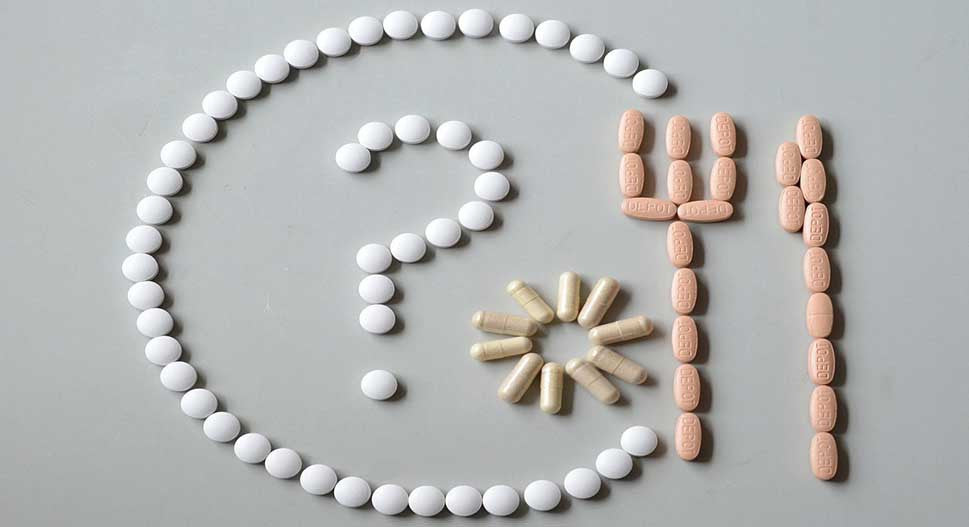
Words by Linia Patel
Given that there is a pill for everything these days, it is not surprising that one of the questions I get asked most as a Dietitian is “are supplements good for me?”
How to get your nutrients
According to the Food Standards Agency almost one in three people in the UK take a vitamin supplement every day, while 15 per cent of us turn to high-dose supplements for a quick fix. But do vitamin pills really deliver the health and vitality they promise?
Well, I am and will always be a “food-first” dietitian. The reasons for this are simple. Food is a complex balance of hundreds of vitamins, minerals, plant-based compounds and various forms of fibre that all work together to provide multiple health benefits. Therefore common advice from dieticians is that if someone has a good, well balanced, nutritious diet, there should be no need for any supplements.
And yes, in a perfect world we wouldn’t need to pop any pills. But in reality, how perfectly balanced is your diet? I have to confess… despite being a dietitian my diet isn’t always balanced (Shhh! Don’t tell!). For most of us it is unlikely we will meet optimal nutrient levels of all essential nutrients, 100% of the time. High-speed lifestyles leave many people gulping down pre-made meals and grabbing food-on-the-go.
If your diet is near perfect, the modern world we live in also has an impact on the nutritional profile of our food. Intensive agriculture, fast-growth crops and food processing means our food is significantly lower in minerals and vitamins than it used to be – not a recipe for perfect nutritional balance.
The excitement over supplements
Dietary supplements are big business. It’s a multi-billion pound industry, so people are obviously very excited about buying and taking supplements. Given the huge range of “health” pills and powders available and bold claims that some supplements make, its success is surprising. Antioxidant supplements like vitamin C and E claim to be the silver bullets against Alzheimer’s, heart disease and even cancer. While taking high-doses of omega-3 whilst you’re pregnant will promote optimal brain development and guarantee that baby becomes the next Mark Zuckerberg!
Food vs vitamin pill
Several studies have taken place to attempt to justify the use of vitamin and mineral supplements and the majority of them have come to the same conclusion. Research has shown that isolating individual nutrients found in food and putting these nutrients into a pill or potion doesn’t quite have the same effect on health.
In the Iowa Women’s Health Study, researchers followed over 38,000 women (between the ages of 55 and older) for a period of 20 years. Results from the study showed that many vitamin and mineral supplements may be associated with increased mortality risk (2.4%). This association was strongest with supplemental iron. However calcium supplements seemed to be associated with a slightly lower risk of death.
So what does this mean? It doesn’t mean that iron and other vitamins and minerals are bad for you. You need to have iron in your diet for you to produce enough red blood cells and people who are anaemic need iron supplements. However the study does suggest that for healthy people, taking an extra iron supplement may actually be detrimental. Other studies have shown that high dose vitamin E supplements may increase your risk of heart failure and too much vitamin A maybe bad for your bones and your heart.
On the other hand, there are some supplements that have been shown to be good for you. Vitamin D was previously thought to only manage calcium in and out of the bones, however in the last decade a whole host of vital functions have been discovered. Adequate vitamin D intake is still important for maintenance of healthy bones and teeth, but there is strong evidence to suggest that that it also provides a protective effect against multiple diseases and conditions such as cancer, multiple sclerosis and diabetes.
Nutrition experts believe that vitamin D may protect against type-2 diabetes by reducing insulin resistance, increasing insulin sensitivity and enhancing the function of the cells responsible for producing insulin (the hormone that manages blood sugar levels). Results from two recent reviews showed that people with low blood vitamin D levels have a 55% higher risk of developing type 2 diabetes.

So should we take supplements?
There is no straightforward answer to whether supplements are necessary, because of the range of products available and also because an individual’s circumstances will govern whether they will benefit from any particular supplement.
When to pop pills
While diet is key to getting the best vitamins and minerals, supplements can help. Nutrient intakes vary throughout the lifespan and very strict diets may need supplementation.
While diet comes first, taking supplements can be a nutritional safety net for:
- Women who are planning a baby or are pregnant or lactating
- Children and teenagers with irregular eating habits
- People over the 50, when absorption of certain nutrients starts to decline
- Vegetarians or vegans
- Dieters or people avoiding certain food groups (may be deficient in key nutrients)
- People with eating disorders or medical conditions (deficiency diseases, absorption problems, lactose intolerance, etc.)
MY TOP FIVE TIPS FOR SUPPLEMENTS
1. Think food-first then supplement the gaps.
A supplement should do just that – supplement. It is no replacement for a healthy diet and lifestyle. Supplements can be used to “bridge the gap” when needed, other than that limit supplement use. The supplement industry is sadly not regulated so remember if something sounds too good to be true – be weary!
2. Take stock of your diet habits.
Are you avoiding a particular food group? If so, learn about the key nutrients that might be missing as a result and then choose a supplement that helps to bridge that gap. For example it makes sense for anyone who is avoiding diary to talk a calcium and vitamin d supplement to make up for these nutrients
3. Be well rounded.
Multivitamins are often a safer bet than taking a cocktail of individual supplements that exceed the daily recommended intake (RDA). Nutrients all work in synergy in the body and if you take too much of one nutrient for too long you are at risk of becoming deficient in another.
4. Respect the limits.
More is not better with supplements. Unless you have blood results that indicate you need high doses – opt for supplements that provide the recommended daily intake. There are some exceptions which a registered Dietitian/nutritionist can talk you through.
5. Find out what’s right for you!
How do you know what’s right for you? The best way is to talk to your doctor or registered dietitian/nutritionist before taking dietary supplements. If you are already taking supplements, ask them if it’s a good choice to continue and if you’re taking the right ones in the right quantity at the right time.

MY SUPPLEMENT REGIME
I take these key supplements:
- Vitamin D3: Approximately 90% of the vitamin D that the body gets is from sunlight. The rest comes from foods, some of which have been fortified with vitamin D during the manufacturing process. If, like me, you live in a country where you might not get as much sunlight as you would like, then taking a good quality vitamin D supplement can certainly help to keep you healthy as vitamin D is linked with literally every health outcome out there.
- Omega-3: Even if you eat salmon and are a chia-seeds-on-everything kinda person, there is a good chance you still need an Omega-3 boost. This is because there has to be the correct balance of omega-6 fatty acids (pro-inflammatory) to omega-3 fatty acids (anti-inflammatory) in your body. Most people are getting significantly more omega-6 fatty acids in the form of soybean oil (added to basically everything). The ideal ratio is 2:1 however most of us are sitting at 10:1 or more. This sets up an inflammatory environment in your body.
- Probiotics. We have more bacteria cells in our body than actual cells. The bacteria in your gut are believed to play a very important role in regulating proper intestinal function and digestion but have also been linked to brain function, appetite control, diabetes and cardiovascular risk.
Read next: Nutrition Truths - The Most Popular Myths Busted >





























































